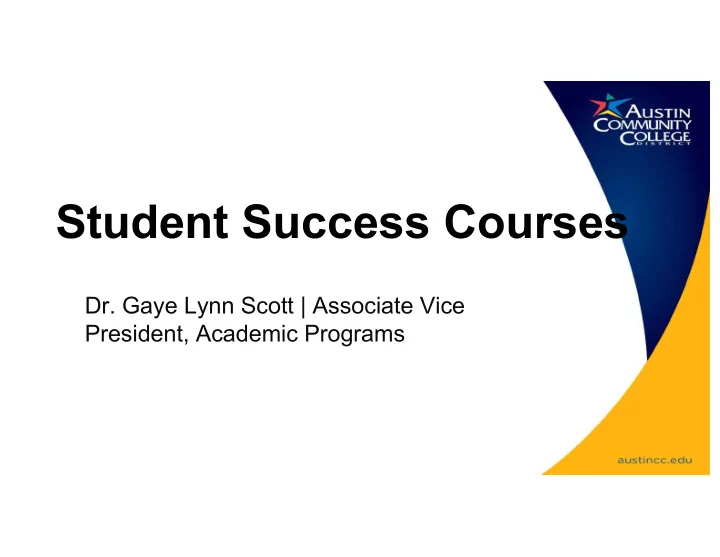

Student Success Courses Dr. Gaye Lynn Scott | Associate Vice President, Academic Programs
Success Course Background • Who? FTACCs <12 SCH • What? Multiple options. – EDUC 1300, 1200, 1100 – POFT 1171 College to Career Success – HPRS 1171 Student Success for Health Professionals – SDEV 0111 Transition to College Success • How? Success course in every AA, AS, AAS, AAT and in CAO of core (EDUC 1300/1200/1100)
Success Course Background: Timeline • Fall 2015: soft launch (FTICs as focus) • Early data: success in sample gateway courses – ENGL 1301: no difference (enrolled and A,B,C vs not enrolled in EDUC 1300) – MATH 1314: 12 point difference (65.79% vs. 55.01%) – PSYC 2301: 13 point difference (89.89% vs. 76.48%)
Success Course Background: Timeline • Fall 2016: full launch • Early data: persistence to next semester – 91.2% of students enrolled in EDUC 1300 Fall 2016 who made an A,B,C returned in Spring 2017. – 53.3% of students who were not successful in EDUC 1300 returned Spring 2017
Success Course: Persistence (F to Sp)
Success Course: Persistence (Sp to F)
Success Course: Variations • Health Professions (HPRS 1171) • CTE (POFT 1171) – Sections for MBPT and RTF students • EDUC 1300 – Puente/Catch the Next/Ascender students – Health Sciences Area of Study (AoS) students – Capital Idea students – ESOL Bridge students
Success Course: Variations • EDUC 1300 – OER sections – Paired sections (with INRW; with other college credit first-semester classes) – Dual credit sections – Hybrid and ONL sections – Fall launch of Institutes with blocked and contextualized classes
Success Course: New variation • HUMA 1301 – Prehistory to Renaissance: Great Questions Seminar – A study of the interrelationships of the arts and sciences and their philosophies and an inquiry into human nature and the values of human life. Students employ an interdisciplinary study of representative samples of literature, art, mathematics and music of various periods and cultures from prehistory to the Renaissance in the context of discussion based seminars to acquire and sharpen effective learning strategies and critical thinking skills, enabling students to better understand, retain and apply information in a higher education environment. – Liberal Arts majors
Success Course: Future plans • HUMA 1301 added to LA degree plans • Develop bank of contextualized assignments – Build Area of Study identity for students with AoS-specific assignment options
Success Course: Questions? • Contact info. – Dr. Gaye Lynn Scott, AVP, Academic Programs (gls@austincc.edu) – Dr. Sam Echevarria-Cruz, Dean of Liberal Arts - Social & Behavioral Sciences (sechevar@austincc.edu) – Dr. Sharon Frederick, Dept. Chair, General Studies & Student Development (sking@austincc.edu)
Recommend
More recommend